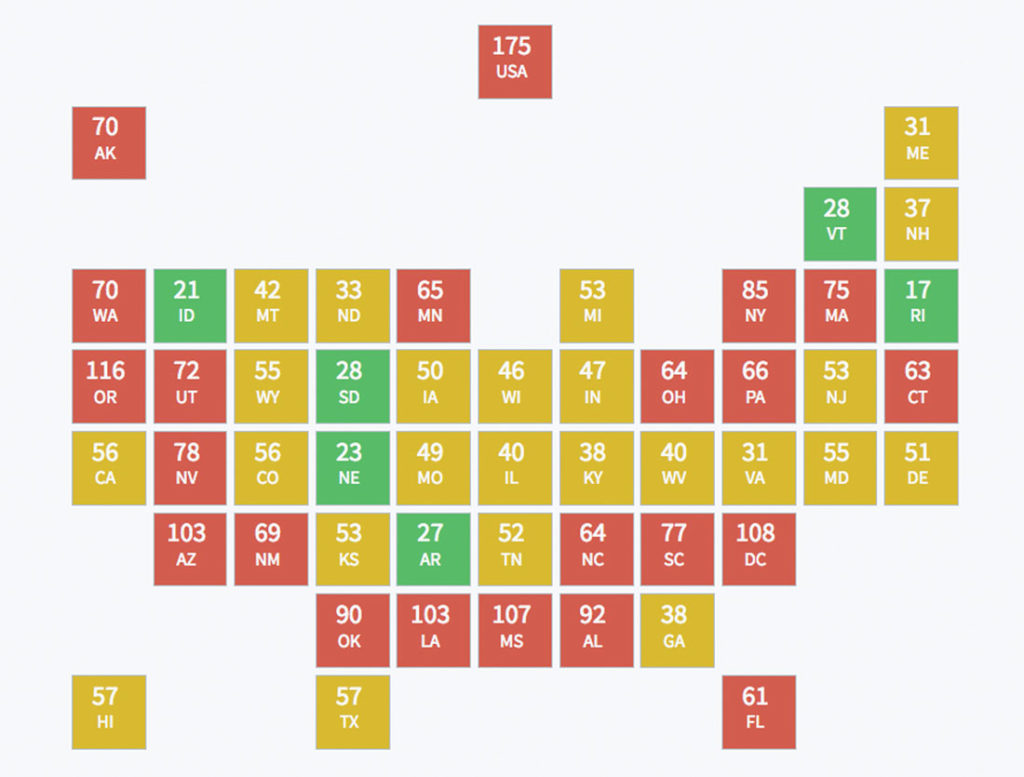For a law associated with sunshine, the Freedom of Information Act (FOIA) hasn’t had much time in the limelight. Long considered the domain of dogged investigative journalists and crackpot conspiracy theorists, FOIA spent much of the new millennium in the shadow of its much more photogenic younger sibling, Open Data. As the world moved more digital and transparency became the default, the idea of citing some arcane legalase to be begrudgingly granted access to records – paper records – seemed such a laughably archaic concept that the whole thing had to be on its way out, replaced by something far more efficient any day now.
And yet here we are, in the middle of what feels like a FOIA renaissance. Just over half a century after FOIA was first signed into law – with state-level public records laws quickly following suit – more people than ever are asserting their legal right to hold government accountable, at both the highest level as well as in their own neighborhoods. Isolation has given way to community, as journalists, activists, and concerned citizens have begun working together to uncover new and exciting ways to uncover what’s being done by ostensible public servants –– and by so doing, remind the government just who they’re working for.
For Sunshine Week, we wanted to look at how public records has been behind some of the biggest headlines of the year and how those stories can inspire a whole new crop of reporting. Sunlight may be the best disinfectant, but transparency is contagious.
Heavy-Hitting National Reporting
• A memo released to the public accountability groups Open the Government and the Project on Government Oversight revealed that Secretary of Homeland Security Kirstjen Nielsen had indeed signed off on a policy of separating immigrant children from their families at the border, despite the administration’s claims to the contrary.
• Contracts released to the Associated Press revealed the Department of Veterans Affairs has spent almost $3 million on private security for Confederate cemeteries following the deadly protests in Charlottesville, Virginia.
• Schedules of several Department of the Interior executives released to reporter Jimmy Tobias reveal the agency is repeatedly opting to meet with industry groups, lawyers, and activists who oppose environmental protections over conservationists.
• In response to a MuckRock request for the reporting and analysis that the Department of the Treasury used to claim that Trump’s tax cut will generate $1.8 trillion in revenue, the agency produced a one-page memo that had been referenced in the request.
• Enforcement records released to the medical journal JAMA revealed that the Food and Drug Administration turned a blind eye to almost a decade of inappropriate prescription and distribution practices for the opioid fentanyl.
Lighthearted Looks into the Federal Government • A list of research projects released to the Federation of American Scientists revealed a multimillion-dollar program of fringe space theories, including stargates, invisibility cloaks, and warp drives funded by the Department of Defense.
• After noticing what appeared to be trading cards for K-9 units at the National Geospatial-Intelligence Agency at a veterinarian’s office in Virginia, reporter Joshua Eaton obtained a full set through FOIA.
• Photos released to ThinkProgress showed Treasury Secretary Steven Mnuchin enjoying his trip to Fort Knox, including several shots of him and Senate Majority Leader Mitch McConnell holding gold bars.
• Development materials released to Emma Best show the considerations that went into the costume for the Department of Energy’s official mascot for renewable energy, the “Green Reaper.”
• Federal Communications Commission complaints released to MuckRock show the public outrage from Michelle Wolf’s now-infamous White House Correspondents Dinner remarks.
State-Level Stories that Made an Impact
• After a request from Vanessa Nason revealed the extent of the backlog of untested rape kits in Juneau, Alaska, the state earmarked $2.75 million to test kits all over the state.
• More than 500 use-of-police-force reports released to NJ Advance Media were used to create New Jersey’s first comprehensive database of law enforcement violence.
• College football concussion reports released to the Atlanta Journal Constitution show a huge variance in the number of incidents reported and that many schools don’t track the data at all.
• A copy of the Chicago Police Department’s “gang database” released to the Chicago Tribune revealed more than 128,000 people listed as gang members, with some alleged members being in their 80s.
• More than 200 requests filed by MuckRock related to #AmazonHQ2 bids reveal millions in tax incentives offered to the company, as well as hostility to public oversight of the process.
Local Reporting on the Lighter Side
• Traffic violation data released to The New York Times reveal a marked increase in the number of issued speeding tickets around the release of each film in the Fast and the Furious franchise.
• Financial records released to Tom Nash reveal that the revisionist Civil War drama Field of Lost Shoes, written by a Virginia energy executive, received $1 million in public funds from the Virginia Film Office.
• Photographs released to William Pierce capture an EMS training exercise in Delaware County, Ohio, in which volunteers helped simulate a zombie outbreak.
• Permits and impound lists released to Lucas Larson reveal how cities all over the country prepared for the sudden onslaught of e-scooters.
• Press releases and incident reports regarding the dangers of Halloween candy released to Paxtyn Merten revealed a lot of fears over marijuana-infused candies but no recorded incidents.
File Your Own
But for all the challenges agencies put up to access records, persistence and creativity often lead to important releases that shed new light on government, our communities, and our country. Visit https://muck.rocks to see a random idea from our new database of public records requests that have worked — and sample text you can use to file similar requests in your community.
More Sunshine
Here are some of the strangest FOIA redactions (and FOIA releases) that MuckRock has seen over the years.
 After nine years and more than 60,000 requests, MuckRock has been witness to some pretty impressive efforts to keep public information from the public. In the spirit of Sunshine Week, we’ve compiled some of the weirdest, wildest, and downright hilarious redactions we’ve received.
After nine years and more than 60,000 requests, MuckRock has been witness to some pretty impressive efforts to keep public information from the public. In the spirit of Sunshine Week, we’ve compiled some of the weirdest, wildest, and downright hilarious redactions we’ve received.
This looks like a job for ████████!
In a release of records related to Scientology, the FBI included a short, fictionalized dialogue between a former member of the church and “the star reporter of The Daily Planet.” Though the bureau redacted the reporter’s name, citing his right to privacy, it’s not that hard to guess that our intrepid interviewer is Clark Kent.
Office Politics
In response to a request for emails related to a now-infamous video showing the FCC chairman doing the Harlem Shake to downplay the importance of Net Neutrality, the agency at first rejected the request in its entirety, saying that releasing that information would have a “chilling effect” on the FCC’s ability to perform its duties. After an appeal, the agency released redacted versions of the emails, citing the same exemption. After that was appealed, the FCC, likely fearing a lawsuit, finally released unredacted copies revealing that it had spent the last year trying to prevent the release of an email that simply stated “OK.”
Why Is it Always the Last Place You Look …
After 17 months of an exhaustive search, ICE closed out a FOIA request for memos related to Donald Trump’s proposed border wall, stating that no such records could be found. While we can’t say for sure where ICE was looking during that year and a half, we do know where they didn’t check –– their own website, where it turns out the documents had been posted in plain sight for over a year.
The $660 Million FOIA Request
In response to a request for how many of a certain type of forensic device the Pentagon’s Office of the Secretary of Defense had in its possession, the agency’s FOIA office responded that the only way to determine that would be to search every active contract. And since those contracts aren’t sufficiently configured for text search, and all contracts would have to be properly processed and redacted, that would take an estimated “15 million labor hours” and cost somewhere around $660 million. While we unfortunately did not have the millions or millennium to spare, what we did have was a request for the same information sent to a different department in the Pentagon. That office sent an email to the actual person responsible for these devices, who physically checked and determined there were, in fact, three.
Lost and Found and Lost and Found (but not Anytime Soon)
After the disappearance of activist Frank Wilkinson’s 132,000-page FBI file –– released after a long and contentious lawsuit –– a request was sent to the FBI for his records. After a puzzling initial response that they didn’t have anything, the FBI directed us to the National Archives, who, in turn, told us to talk to the FBI. Finally, after months of back and forth, a NARA archivist was finally able to track down the material. But there was just one catch: If we wanted them released, we’d have to get bumped to the “second track” tier, which is capped out at 1,000 pages a year. When asked to confirm if that meant that re-releasing this previously released file would take over a century, the archived helpfully responded “quite about.”
Of course, it’s not just the federal government that gets creative when it comes to the public records process. At the state and local level, we’ve seen the following:
• A police department in Brockton, Massachusetts, responded to a request for records on the use of drones by law enforcement with images of UFOs and instructions on how to fold paper planes.
• In Brunswick, Maine, a town clerk claimed that simply opening an email served as an agreement to pay $750 in public records processing fees.
• The New Jersey Department of Agriculture denied a request for the results of an autopsy on a dolphin that had died in a Jersey river by citing the dolphin’s right to medical privacy.
• The Seattle Mayor’s office responded to a request for text messages by photocopying a phone.
• The Washington State Fusion Center caused an uproar after accidentally including in a records response an email forward they had received about mind control technology.
How Does your State’s Public Records Law Measure Up?
MuckRock’s interactive database provides general overviews of state public records law
For more than 50 years, the Freedom of Information Act (FOIA) has been the governing federal law that mandates what records and federal agencies are subject to transparency. Although it is the law of the land, the act permits each state to hold its own set of public records laws.
There are 50 state records laws, all with different statutes, exemptions, and limitations that dictate what you can get from your state and local agencies. With the rules to access differing across the board, MuckRock provides an easy way to keep track of them all through our interactive database.
At a glance, our MuckRock place page gives a quick overview of each state’s average response time and states that block out-of-state requesters, as well as state exemptions and government branches exempt from records law, per each state.
If you are looking for more information on a state’s records law, you can click any of the 50 states on our map (muckrock.com/place/) to access our state-by-state guides. Our state guides give readers an in-depth overview of each state’s records law, notable attributes of the law, and supplemental knowledge on appeal processes and statistics.
You too can be a part of our database by helping us expand our appeal and exemptions page. We’re looking for winning appeal language and commonly cited state exemptions to help other requesters file successful appeals and navigate state exemptions. You can send us your winning appeals and exemptions through our assignment page. Your insights will help hundreds of requesters unlock records across the nation.
This Sunshine Week, know your rights to government information with tips from the transparency experts at MuckRock.
1.) Know the law: Federal agencies are subject to the Freedom of Information Act (FOIA), but each state has its own laws (For examples, it’s the Freedom of Information Law in New York, and in New Jersey, you file an Open Public Records Act request or OPRA.) Look up which rules apply — in some states, for example, legislative records are exempt from disclosure. Cite the correct law in your requests.
2.) Keep it specific: FOIA can be used to dig up all sorts of information, but you have to ask for something that exists. Avoid asking questions. Instead, request documents or data an agency would likely have that would answer your questions.
3.) Work together: Most records officers are happy to discuss requests. There’s also a community of requesters eager to help: Look up your local National Freedom of Information Coalition chapter or browse requests others have filed publicly on MuckRock.
Other Online Resources
The Reporters Committee Open Government Guide:
rcfp.org/open-government-guide/
MuckRock’s state-by-state guides:
muckrock.com/place/
NFOIC’s map of state Freedom of Information organizations:
nfoic.org/organizations/map
JPat Brown is the executive editor of MuckRock, a Massachusetts-based nonprofit collaborative news site devoted to giving the public tools to keep our government transparent and accountable.












